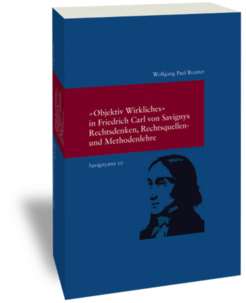»Objektiv Wirkliches« in Friedrich Carl von Savignys Rechtsdenken, Rechtsquellen- und Methodenlehre
[‘Objective Reality’ in Friedrich Carl von Savigny’s Legal Thought, Sources and Methodology]
Wolfgang Paul Reutter
Studien zur europäischen Rechtsgeschichte 263
Savignyana 10
Frankfurt am Main: Klostermann 2011. XX, 478 p.
ISSN 1610-6040
ISBN 978-3-465-04131-3

Studien zur europäischen Rechtsgeschichte 263
Savignyana 10
Frankfurt am Main: Klostermann 2011. XX, 478 p.
The 10th volume of the Savignyana presents a comprehensive study of Friedrich Carl von Savigny's legal studies and their philosophical, theoretical, dogmatic and methodological premises. The primary aim is to firmly establish Savigny as a jurist who fundamentally and continuously thought in terms of ‘objective realities’, which consequently grounded all of his legal studies. The three fundamental questions of this book are:
- Does the analysis of Savigny’s main sources yield an image of a jurist who is forever thinking in terms of “objective realities” and does so in independently and consistently?
- Does this image persist throughout Savigny's productive period and does it pervade every detail of his legal thinking?
- How do the details of Savigny’s legal thought have to be modified if one starts from the premise of their possible “objective-idealistic” connotation?
No matter where exactly one delves into Savigny’s legal studies, whether a general overview or in-depth on a particular regulation, everything, without conceptual fissure, is related to certain assumptions of being and cognition that clearly originate in a specific philosophy of ‘objective reality’. To the extent that Savigny’s writings reflect this thesis, the notion of an “objectively real” law in his thought becomes nothing less than an absolute centre of gravity and simultaneously the source of positive law’s reality with a beginning and an end, a genesis and a decline, actual content and a specific solution, a ‘higher’ meaning and a factual essence. Consequently, the positive law of Savigny’s legal theory then takes on the status of an “objective reality” and is therefore endowed with certain freedoms as well as with certain limitations from root to final dogmatic branch. This conclusion helps to fundamentally reappraise of Savigny and to initiate future reappraisals. More specifically, many aspects of Savigny’s legal thought, which until now have been severed from their ‘objective-idealistic’ connotation and whose integration into general notions of right and wrong has suffered as a result, will to be reappraised anew.
